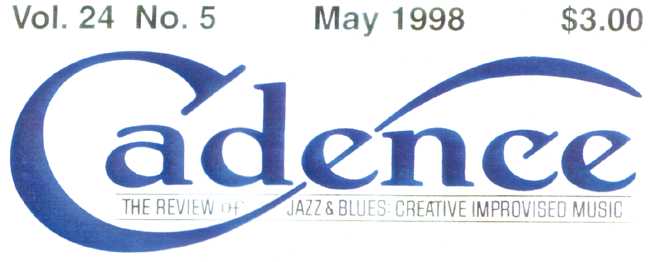
Presse Internationale -- U.S.A.

mai 1998
Volume 24 N°5
Reviews
Nelly Pouget
" Le Voir "
NELLY POUGETIMARILYN CRISPELL, LE VOIR,
(2) MINUIT REGARDS 27972.
Lumière / Hara / Le Voir / Alysée Musicora 93 /
Ange Exorcisé / Sculpture / Paix. 35:33
Pouget, ss, as, ts; Marilyn Crispell, ac p. 10/25/97, no location
given.
I have not heard either one of Nelly Pouget's first two releases (5/92, p.100; 7/94, p.99) but both reviews were quite positive. The first was a quartet date featuring Sunny Murray while the second one found her in a septet with such fine musicians as Horace Tapscott, Andrew Cyrille, and Jean Francois Jenny-Clark. Her new effort pairs her with Marilyn Crispell for a series of pieces that are, at turns, expository, personal, meditative, and driving. Ms. Crispell is quite empathetic here, orchestral but never showy. She does not follow Pouget - instead she is an equal partner in the music.
"Lumiere" opens the program. The word means "light" or "illumination" and one can hear how the music opens up from the start, the pianist's lines pushing at the saxophone like waves on the shore. The work continues to evolve, phrases stretching, the piano lines moving from percussive to melodic, Ms. Pouget varying the dynamics, hard lower notes to softer high ones. "Hara" starts with a short poem (in French) that leads into a melody built upon short phrases either vocal-like or longer tones. Halfway through the piece, the piano falls away leaving the tenor to build upon the earlier melodic fragments - now, there is a strength to the playing that lasts right to the close. Pouget dedicates "Alysee Musicora 93" to Albert Ayler. There's a folk-like quality to the melody (played on alto) placed atop gospel-sounding piano phrases. The piano lines evoke Keith Jarrett, even down to the droning bass figures. The melody is so sweet, so playful, that even when Pouget goes "outside" the sound is not ponderous but liberating.
One is tempted to describe each cut because the music is so fresh and so singular. Ms. Pouget certainly has influences but her own vision shines through. Some of this music is as simple as breathing, as if the composer simply followed her muse. These pieces may be composed, even through-composed, but they never feel formal. That's a gift few musicians have, to create music that flows, that lives, that says "this is who I am." All she asks is that you listen - I recommend you do.
Richard B. Kamins